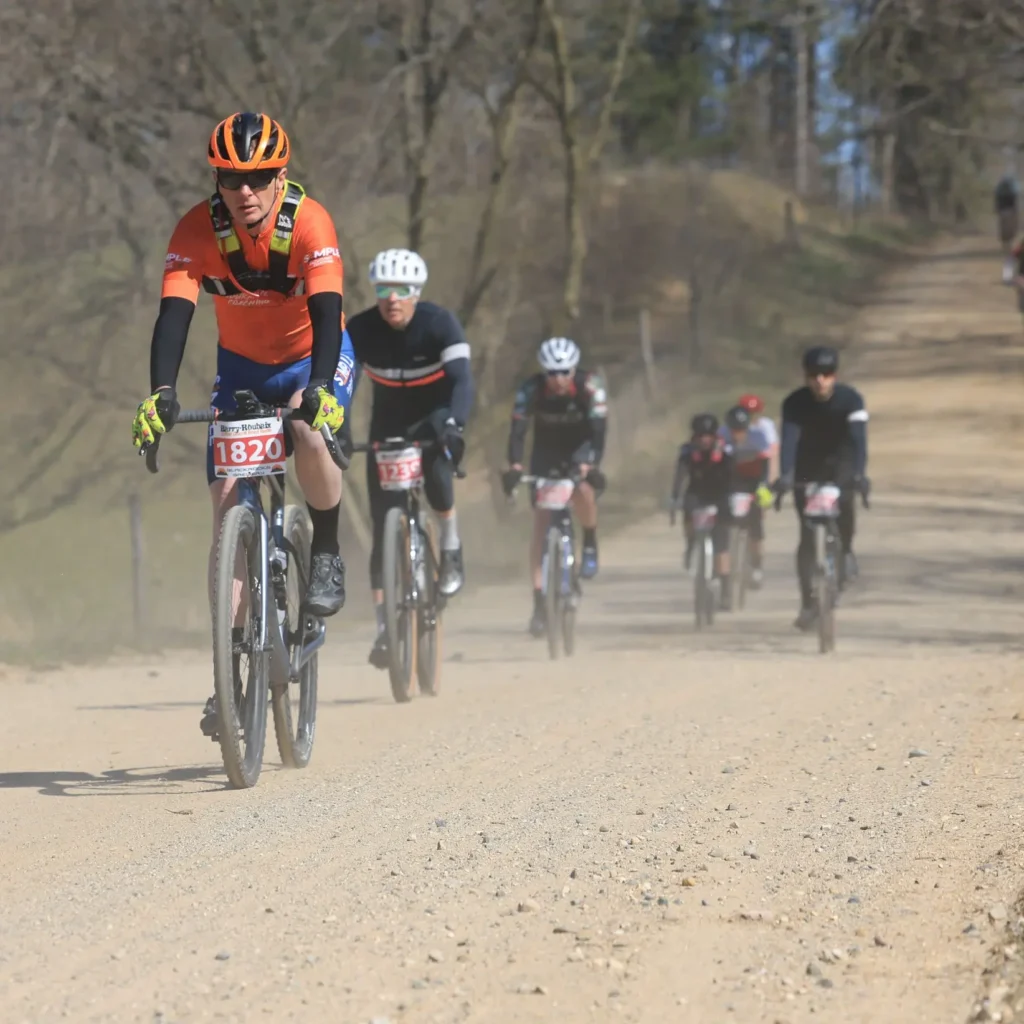All of us have been there: The moments when we question our life choices that brought us to this really long gravel bike race.
Maybe the weather was unusually tough, or there were mechanical issues, we didn’t fuel properly, or maybe the tedium of riding that many hours just got to our head.
“Why am I doing this? I’m not having fun any more.”
We’ll talk about seven skills you can learn or re-learn that will help you avoid those soul-crushing moments or manage them when they come during epic gravel races.
This is the eighth and last in a series of articles about gravel racing:
Blog post #7: Gravel Race Success As A Cyclist Over 50
Blog post #6: Hydration and fueling for a gravel century
Blog post #5: Strength training for gravel cycling performance
Blog post #4: Using intervals to improve performance
Blog post #3: Using the 80/20 model to schedule workouts.
Blog post #2: Building a base for gravel racing performance
Blog post #1: Five keys to training for gravel racing

Skill 1: Visualization and Mental Rehearsal
Mentally rehearse riding through different aspects of the race, from the start to the finish line.
Research shows that visualization can enhance performance by priming the brain and nervous system for the physical movements required during the event.
So it’s worth driving as much of the course as possible prior to the race to understand the particular features.
Athletes can visualize themselves navigating challenging terrain, overcoming obstacles, and maintaining a strong pace.
It’s important to also visualize taking care of mishaps: Watch yourself successfully handling a flat tire or a crash, and you’ll be in a better position to keep a positive mindset if something goes wrong.
Skill 2: Goal Setting
Setting clear, realistic goals for the race is essential for mental preparation.
Whether it’s completing the race within a certain time frame, achieving a personal best, or simply finishing strong, having goals can provide you with focus and motivation.
Generally, my goal is to keep my heart rate and power under threshold while maintaining my carbohydrate consumption.
Those are both process goals since I typically don’t have an outcome goal for a gravel race – other than to finish.
You might want to set both outcome goals (e.g., finishing in the top 10) and process goals (e.g., maintaining a steady power throughout the race).
Skill 3: Mindfulness and Stress Management
Long-distance gravel racing can be physically and mentally demanding, so it’s important to manage stress and stay present during the event.
Mindfulness techniques such as deep breathing, progressive muscle relaxation, and meditation can help athletes stay calm and focused before an event, even in challenging situations.
Research suggests that mindfulness can improve athletic performance by reducing anxiety and enhancing concentration.
During the race, practicing your breathing can keep you calm.
This is the most challenging for me since my brain is always chattering at me.
I work a lot at practicing breathing – making sure I’m rhythmically breathing into my belly.
This is a great thing to practice while doing hard intervals: work on relaxing your upper body and breathing into your belly.
Skill 4: Positive Self-Talk
One of the most important tools you can practice on long training rides is maintaining a positive inner dialogue leading up to and during the race.
Research has shown that positive self-talk can boost confidence, increase motivation, and improve endurance.
Remind your audience to replace negative thoughts (e.g., “I can’t do this” or “I’m not strong enough”) with positive affirmations (e.g., “I am strong and capable” or “I’ve trained hard for this”).
This is not something to try out while in the heat of racing.
Pick one positive affirmation and practice it during long endurance training.
Skill 5: Adaptability and Resilience
Gravel racing often presents unpredictable terrain and weather conditions, so racers must be adaptable and resilient.
Shit is going to happen in a gravel race.
One way to look at the challenges is as an opportunity for growth rather than some kind of setback that reflects on you in some way.
Research suggests that athletes who view adversity as manageable and temporary are better equipped to overcome obstacles and maintain peak performance.
This goes back to the kind of mindfulness and visualization practice we mentioned earlier.
Practicing this kind of attitude during training rides means it will be possible to do in the race.
Skill 6: Pre-Race Rituals
We all do a lot of training and racing.
Establishing pre-race rituals can help you get into the right mindset and optimize your performance.
Whether it’s listening to a specific playlist, performing a warm-up routine, or visualizing success, rituals can create a sense of familiarity and confidence.
Experiment with different rituals during your training to determine what works best for you.
I keep changing mine but it usually involves a warmup while listening to upbeat music – or, if it’s a cyclocross race, it’s intense angry music, plus some food and water intake, using the bathroom and making sure I’m at the start line early enough to get a decent position.
I also try to talk with people at the line to keep my nerves and brain chatter at bay!
What works for you?
Skill 7: Post-Race Reflection
After the race, it’s good to reflect on your performance and identify areas for improvement.
For example, did you climb well, did you manage the corners, did you keep up with your nutrition?
Research suggests that reflective practice is essential for learning and skill development.
Celebrate your achievements, learn from mistakes, and set new goals for future races.
Have an epic day on the gravel roads!
By incorporating these mental training strategies into their preparation and race-day routines, you can enhance you performance and maximize your potential for success.
It’s critical to practice all of these skills during training rides, writing them down and revising them as you learn about what works.
Consistency and repetition help build mindfulness patterns that will help you be successful on race day!
These are all skills that will help bring you more joy during long, challenging gravel races.
What do you do to keep your head in the game?
Need more?
Unlock the secrets to mastering gravel racing with our FREE Guide to Gravel Racing! Get yours here.
BOOK A CALL so we can discuss your goals, answer questions, and talk about making your endurance training more effective, fun, and Simple.
Paul Warloski is a:
- USA Cycling Level 1 Advanced Certified Coach
- RRCA Running Coach
- Training Peaks Level 2 Coach
- RYT-200 Yoga Instructor
- Certified Personal Trainer
- Certified Nutrition Advisor




